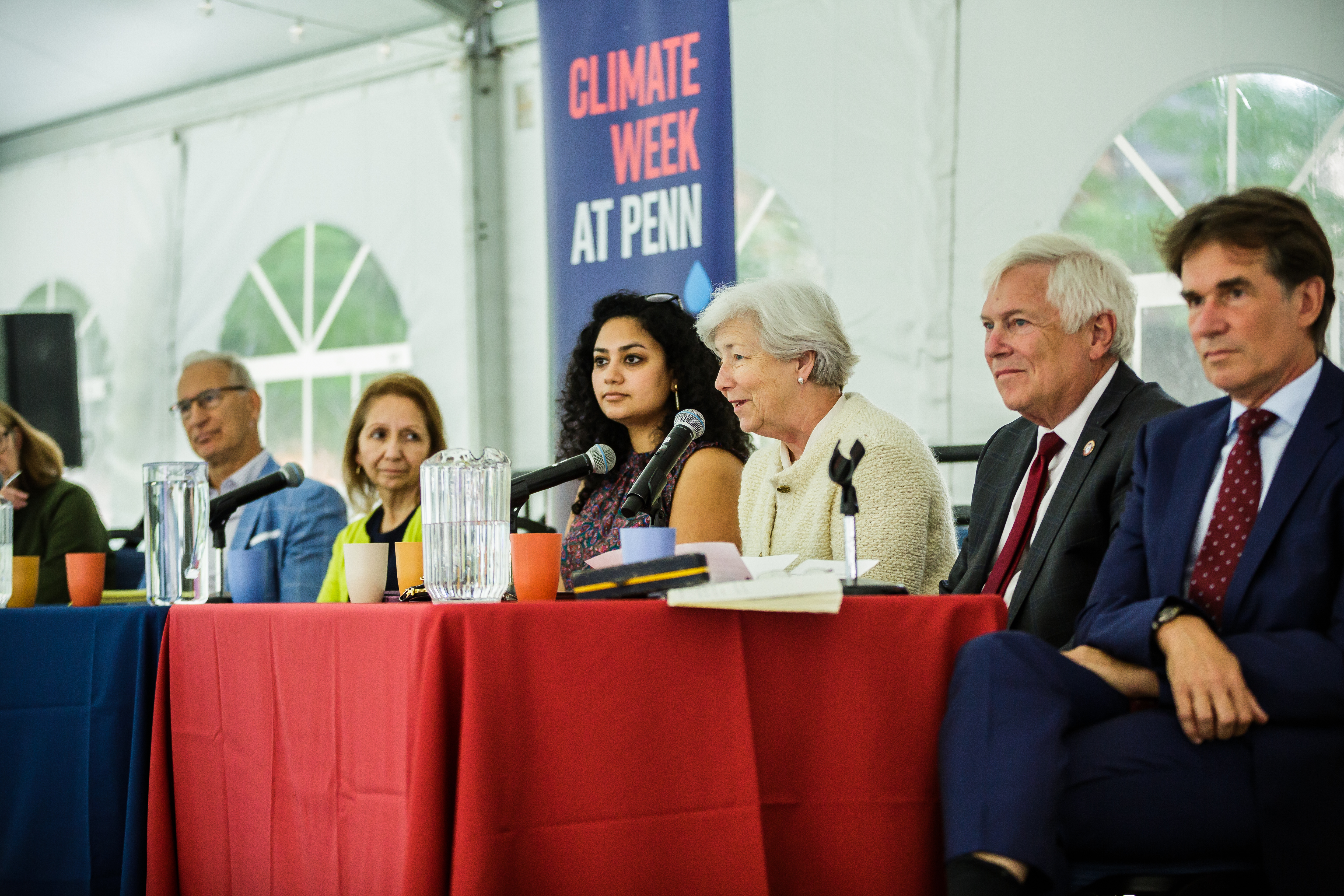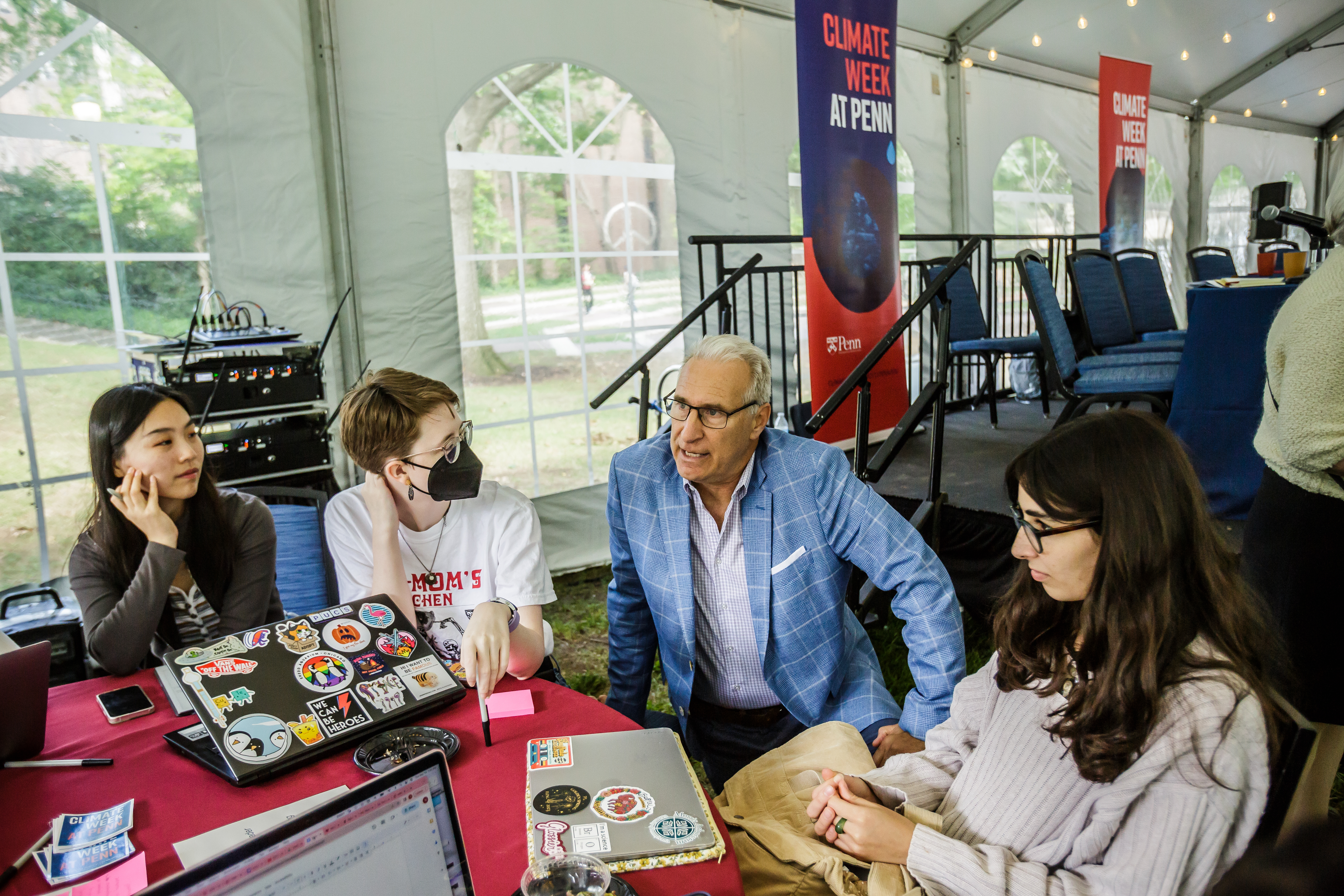
The medical community is seeing the effects of climate change on human health every day, Perelman School of Medicine associate professor Farah Hussain said, listing a few: more deaths from extreme weather events, increases in asthma and COPD from poor air quality, more patients experiencing anxiety and post-traumatic stress disorder “after losing their loved ones and their livelihoods in storms and floods and fires.”
Hussain represented the dean of the School of Medicine at a Climate Week event on Sept. 19, “Collaborating on Climate and Health: A Discussion with Deans.” Penn is unique in having five health schools on one campus, and she was joined by four deans: Sara S. Bachman of the School of Social Policy & Practice (SP2), Andrew M. Hoffman of the School of Veterinary Medicine, Antonia M. Villarruel of the School of Nursing, and Mark Wolff of the School of Dental Medicine.
The event focused both on how climate change is impacting their fields and on how their fields have contributed to the climate crisis, through manufacturing, supply chains, and infrastructure.
“If we take a look at the climate crisis as a social determinant of health, we have the ingredients in order to make impactful changes in mitigating some of these particular areas,” Villarruel said. She added that nurses, as trusted sources of information, are “well-prepared to prevent and mitigate the effects of climate change on individuals, families, and communities, both locally and globally.”
Bachman said as people in SP2 research innovative, effective solutions to oppression and inequality, they look at how to “mitigate the unevenly distributed social consequences of climate change. The impacts of global warming are impacting the least prepared communities, and these communities are being hit the hardest at both the global and the local level.”
She pointed to Jisung Park’s work, noting that it has shown how heat impacts children’s learning and test scores; Alice Xu, who studies the impact of environmental politics in the Global South; Chenyi Ma’s research on the human toll of climate-related disasters; and Femida Handy, who looks at the transfer of environmental behaviors and attitudes between generations.
Wolff said dentists see more cancellations on hotter days, but he also pointed to ways the dental industry has harmed the environment—and what’s changing. He said 15 years ago, the most popular dental material was dental amalgam, which is 50% mercury but ends up in solid waste and waterways, and he said Penn Dental Medicine barely uses it today.
He noted that impressions taken of patients’ mouths could be found in landfills at thousand years from now and still look the same, and questioned whether dentists could eliminate the use of elastomeric impression materials by doing impressions electronically.
Hoffman addressed how the veterinary sector is contributing to carbon emissions, through the medical supply chain as well as manufacturing and distribution of pet foods. He noted that the School of Veterinary Medicine’s Climate Connection Statement outlines specific commitments to reduce emissions in its operations.
As for how the climate crisis is impacting veterinary medicine, Hoffman said veterinarians are increasingly caring for animals with heat-related illness or loss of productivity, such as decline in milk production. He added that climate change drives the spillover of viruses from animals to people, increases exposure to antimicrobial resistance, and hastens the migration and eventual extinction of animal species.
Hoffman noted that health was not central to the international conventions on climate change until recently, but “now leaders from around the world see that our health, and particularly the health of marginalized people around the world, is central to addressing the impacts of massive climate change.”
Julian Fisher, director of Oral and Planetary Health Policies in Penn Dental, said the Sept. 19 event came out of the World Health Organization’s work on climate change and the fact that COP28—the United Nations’ climate change conference this year—will have a day dedicated to health. Fisher co-moderated the event with Karen Verderame, assistant director of outreach education for Penn Vet.
After the deans spoke, groups of attendees discussed how the Penn community could influence policy, connect with the larger community to improve social determinants of health, and reinforce the impact of research to support action on climate change.








